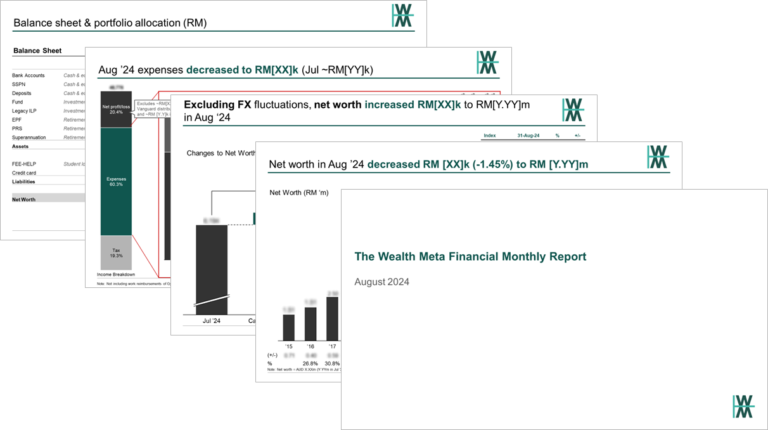(Yes, that screenshot is a previous version of my Excel dashboard report with fake numbers. I’ve since shifted my reporting to PowerPoint, but I still use the Excel file for a lot of data collection, calculation and analysis)
When I was finishing up university, I was your typical broke student. I also had debt, which I used to finance my lifestyle, even when I wasn’t earning any income.
I didn’t know how much I was spending and had no idea how I was going to pay back my debts. I was also desperate to find a job, which compounded the stress of my financial situation.
Something had to change.
So I started reading about personal finance and started tracking every single cent that I spent and earned. I was then able to see clearly where my money was going, and I ruthlessly reduced expenses wherever I could. It helped me navigate a tough time by being in control of my finances.
Today, I still track all my income, expenses and and my net worth. It has given me much insight into my spending habits, life priorities, current financial situation and future potential.
At a minimum, everyone should track their finances for at least a period of time during each major life stage.
You need to start tracking your finances before developing a Financial Plan
The first and most important step before doing anything else is to track your finances. This means consistently:
- Recording all your incoming and outgoing cash flow: Income and expenses across payslips, grocery receipts, eating out, movie tickets, etc., which is essentially your Income Statement
- Capturing a periodic snapshot of your net worth: What you currently own (assets such as money, investments, house) and what you owe to others (mortgage, credit card debt), which is essentially your Balance Sheet
- Monitoring investment performance: Technically this falls under net worth calculations (and income for dividends/distributions). But it’s a little more nuanced, with the need to record cost basis (the price you bought into the investment) and transaction dates.
For me, this is non-negotiable.
How would you be able to start developing your financial plan without knowing your starting point? You need to understand your current financial habits and situation before you can figure out the path forward.
Below I outline 5 reasons why tracking your cash flow and net worth matters to achieve financial independence.
The 5 reasons for tracking finances are:
1. What gets measured, gets managed
This is an overused trope that is highly relevant to personal finance. If you don’t know what you have, how you earn and spend money, how are you going to make sound money decisions?
By consistently tracking and reporting your finances, the habit alone keeps you focused on your financial goals, on top of giving you the information and insights you need to improve your finances.
2. Establishes a starting point for your financial plan
Let’s say you have envisioned your future state, having achieved your goals, dreams and financial independence. To get there, you need to develop a financial plan to achieve that future state, like a roadmap or a plan. But to design your plan and set realistic goals, you need to understand your starting point to know the effort and journey required.
Tracking your net worth reveals your current state and how far away your goals are. Plus, it’s always great to watch your net worth increase over time, like a new high score.
3. Ensures you design an accurate budget
The reality is trying to estimate how much you spent previously or predicting how much you’ll spend in the future is likely inaccurate. People are good at estimating recurring expenses such as groceries, transportation, rent, etc., but struggle with abnormal or once-off expenses, such as car repairs, medical bills, and so on12.
When you diligently track your income and expenses, you accumulate detailed information on where your money is coming from and going. From there, you’re able to analyse your expenses and create a budget that accurately reflects your spending habits, in addition to identifying expenses that you could potentially reduce to increase your savings rate.
4. Gain insights into your relationship with money
When you start delving deeper into how you save and spend your money, you begin to understand more about yourself, the way you perceive money and your priorities in life.
For example, I chose to buy a second-hand Japanese car, even though I have more than enough income and net worth to buy a sports/luxury car. However, I’m willing to spend money on premium parking, valets, and tolls. To me, it shows that I value convenience and time, and I don’t care much for driving a car which can go from zero to a hundred in less than 10 seconds.
5. Benchmark the performance of your investment portfolio
When you start investing, you need to measure the actual returns of your investment portfolio based on the financial instruments (assets) and portfolio allocation strategy you have chosen. You do this by tracking your net worth periodically, alongside how much you’ve contributed to your investments.
This also helps with comparing your investment performance to the average long-term historical returns for your asset class and reviewing your investments if necessary.
For example, say you invested in an ETF which generated a return of 5.6% annually for the past 10 years. When compared to the average historical stock market return of ~9-10%, you’ll want to consider reallocating the capital into another ETF.
Bonus: Organise financial data for future reference
A practical benefit of tracking every transaction is that tax reporting becomes much easier. All the information you need on how much you’ve earned, any tax deductions/reliefs you need for the year, is all in one place. Also, if you’re tracking your finances regularly, you’re likely filling away those receipts and other documented evidence together in an organised fashion. So when it’s time to dig up those records, it won’t be such a chore.
How to make tracking finances a habit
Ever read the book Atomic Habits by James Clear? (Yes it’s an affiliate link). If you haven’t, you should. it’s a great book, and highly relevant especially to help ensure you consistently track your finances. Below I highlight examples of how to make tracking your finances a successful habit based on the four key principles in the book:
- Make it obvious: Set a reminder and calendar invite at the end of every month so that you remember to do it and have scheduled dedicated time to complete it
- Make it attractive: Find an accountability buddy to check that you are tracking your finances (if you have a partner, this is even easier)
- Make it easy: Everything is digital now. Streamline all your payments / transactions onto one card, so all your data is in one statement
- Make it satisfying: Reward yourself once you’ve completed tracking your finances, but making a personal/guilt-free purchase from your allocated budget
Conclusion
Tracking your net worth, income and expenses is one of the most critical aspects of attaining financial independence. Many personal finance aficionados enjoy looking at the numbers a little too much, and you should too.
You may think it’s a bit extreme. I think in this age of credit cards and digital payments, there is no excuse. A lot of it is digitised and automated. At a minimum, I recommend tracking diligently for one year for you to have an accurate of your actual expenses. There are lots of expenses which don’t occur monthly (such as school fees, car maintenance, birthday gifts, etc.) which you need to account for.
For the next post in this series on Financial Planning, I will describe the details on what you need to be tracking, and how to track with selected tools. Stay tuned.



